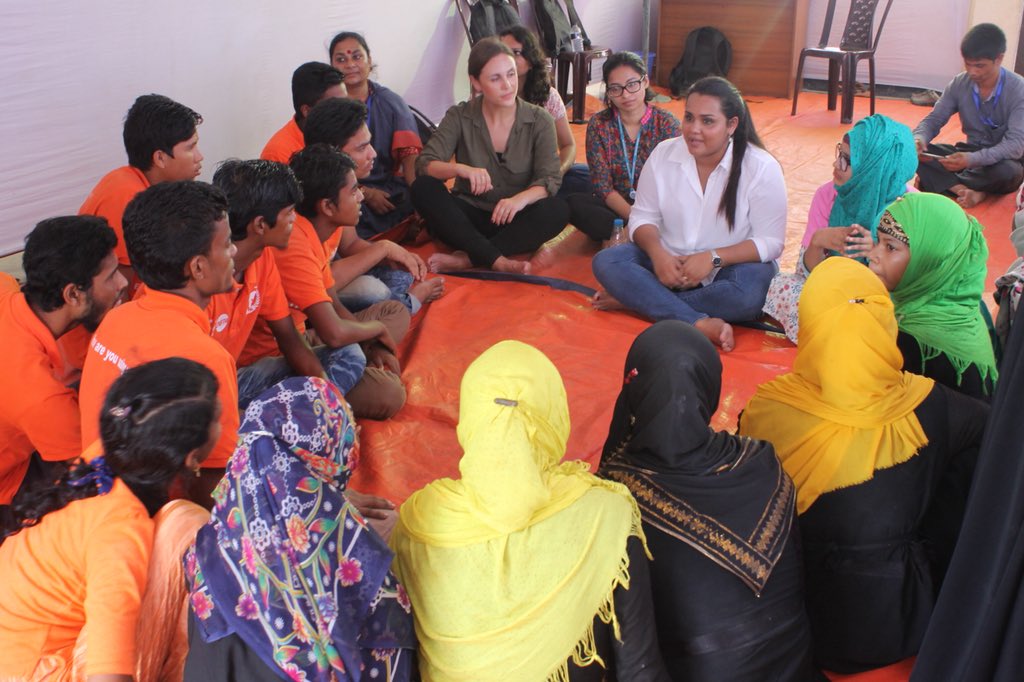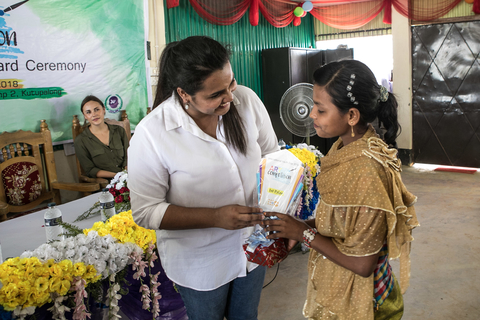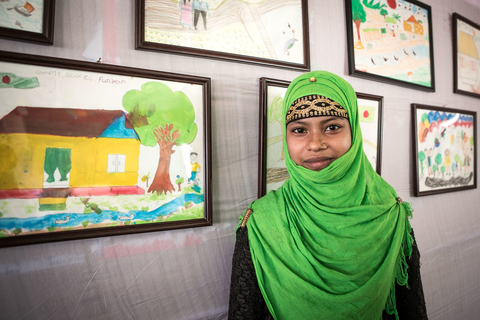KUTUPALONG REFUGEE CAMP, COX'S BAZAR DISTRICT, Bangladesh - The healing power of art and creativity has been on full display in the Kutupalong Rohingya refugee camp in Cox’s Bazar, Bangladesh, this International Youth Day.
Children and young people there and in the surrounding host communities have been holding an art exhibition at the local community centre to celebrate IYD2018 and its timely theme – Safe Spaces for Youth.
A group of talented young people also put together a play about sexual harassment on the streets, which they performed for the UN Secretary-General’s Envoy on Youth, Jayathma Wickramanayake, who visited the camp and other parts of Cox’s Bazar just days ago.

UN Youth Envoy Jayathma Wickramanayake with Rohingya youth in Cox's Bazar

Art competition winner Jasmin gets her trophy from the UN Youth Envoy Jayathma Wickramanayake
Ms Wickramanayake, who advocates in partnership with UN agencies for the rights of youth globally, presented art exhibition winners with trophies and also sat down with the group of youngsters and talked about the different ways in which sexual harassment can occur in the camps. They discussed strategies to empower girls to stand up to such abuse, and help boys to understand that sexual harassment is not okay.
“The young people here are being taught about respecting rights and respecting personal space, which is fantastic,” she said. “But what’s so encouraging is that they are then going out into their own communities and teaching other young people, as well as adults, that they should be respectful too.”

Tahera with her painting of a safe space for youth (Image: Carly Learson/UNFPA Bangladesh)
Tahera is 12 years old, and has participated in all the programmes she can. She has learnt about sexual and reproductive health, art and drama, and both performed in the play and had her artwork displayed at the exhibition.
“I liked learning skills to help deal with boys who harass us when we’re walking on the roads,” she said.
Like many other young Rohingya girls, she’s also taken part in UNFPA-supported life skills classes, where she’s learnt how to sew. She’s taken those skills back to her community where she has start-ed repairing clothes for people in the camp.
“I love sewing and so I started fixing dresses just to practice,” she said. “But soon I had so many people bringing me their clothes to fix I had to get some of my friends to come and help as well. It’s nice to make some money, and when I’m older I really want to be a tailor.”
UNFPA has been working to support Rohingya refugees and host communities in Bangladesh for several years now, but when about 700,000 people poured into the country after fleeing horrific violence and other atrocities in Myanmar last year, the programme was scaled up dramatically.
Since last August, when the exodus began, about 114,000 women have received dignity kits with essential supplies including clothing, sanitary items, soap and washing powder; 3,800 women have given birth with the delivery care assistance of UNFPA-trained midwives, and Women Friendly Spaces and adolescent and youth clubs have been built in 20 locations across the camps, as well as in schools and among host communities.
UNFPA works with a number of local partners, and the Bangladesh Government, to provide outreach, healthcare, counselling and psychosocial support to women and men right across the camps. As well, 100 case workers have been trained to deliver Gender Equality in Schools training, a pro-gramme that will be scaled up further.
UNFPA Country Representative Asa Torkelsson said UNFPA wishes to continue supporting the Government of Bangladesh and civil society partners to provide more safe spaces for young people. She also thanked development partners for their generous support to UNFPA's work.
“International Youth Day is a time to remember that all young people deserve to have a place where they can speak freely, express opinions and have some privacy, as well as obtain vital information on issues that will help shape their lives.” she explained.
“In fact, it would be great if the whole world were a safe space for youth.”
For more on UNFPA's response to the Rohingya crisis in Bangladesh, and to learn how you can support Rohingya youth and women, please visit http://www.unfpa.org/Rohingya


